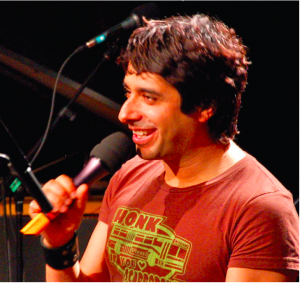
Why gossip about Ghomeshi when you can focus on the big picture instead?

The energy we spend talking about this guy could be better spent elsewhere. ••• photo via Wikipedia commons
Jian Ghomeshi.
It’s hard to escape that name lately, isn’t it?
Don’t worry; I’m not going to offer you my opinion about the scandal. I’m more interested in the lessons we can learn from the unrelenting debate surrounding it.
Ever since the story about the once-beloved Q host broke, discussions about what side to take, what is permissible and what isn’t, victim blaming, male privilege and more have raged across the internet.
While we can take sides and blame whomever we feel it is appropriate to blame, we can all still be found wanting. We all shoulder the blame of continually perpetuating concepts of male privilege, victim blaming and so much more. The problem is, we are so concerned with arguing in favour of our ‘side’ when issues like Ghomeshi-gate flare up — like this is some sort of perverse sporting event — that we neglect to look at our own behaviour.
It is important to remember that we do not know all of the facts, and chances are, we never will. These situations typically leave us in an absolutely awful position to be making arguments about who is ‘right’ — what we can do though is make sure that we act rightly.
Say your good friend accused another friend of sexual assault. You may not know all of the facts, and chances are you never will. You also will probably never be able to fully and completely empathize with either individual – even though you may have been in a similar situation before, every situation is unique. Therefore, it becomes extremely important to not place blame, name call, or point accusing fingers at anyone.
“Innocent until proven guilty” is a crucial pillar of our justice system, but it is important to keep in
mind that this is a commitment to fairness and neutrality, and it doesn’t mean “treat the other side as lying until proven otherwise”. You need to make sure you act sensitively, and thoughtfully, and that you do not perpetuate any of the ugly victim blaming tendencies that exist in our society. You may be powerless to determine “what actually happened” but you have absolute control over your own behaviour.
Beyond making sure we behave fairly in situations where we lack complete information, acting rightly requires that we take an active stand when we come across behaviours and attitudes that are unambiguously wrong.
Consider last year’s SMU frosh chant scandal. The chant had been used for years, and not a single man spoke up and said, “Hey, this is inappropriate”. Of all the women who heard it, one did attempt to expose it as sexist – but her lone voice was ignored by a disinterested student union administration. Perhaps more people did complain about the chant in private conversations, but until it exploded as an international scandal, not enough took a stand where it mattered the most, in the public view.
It’s easy to criticize SMU students and officials for failing to address that horrible chant for so long, but we need to look at our own actions. Are we really doing everything we can to call out inappropriate behaviour where we find it?
One thing we can do is to act when we notice ourselves or other people engaging in behaviour that places the blame on victims. We need to stop saying things like “she was asking for it.” Recently I read a comment on a friends Facebook page underneath that new viral video from Hollaback – the one in which a young woman walks around NYC in a crew neck shirt and jeans for ten hours and videotaped the verbal assaults from men as she walked. The post read something to the effect of, “why is she wearing such a low cut crew neck? If she didn’t want attention she shouldn’t be wearing that shirt.”
This sort of attitude crosses the gender spectrum, and it needs to stop. A woman should be allowed to be comfortable in whatever she wants to wear. Her clothing choice doesn’t somehow validate otherwise inappropriate behaviour. Men need to stop abusing such sexist societal assumptions. Women need to stop blaming other women.
When we walk into a new “room” – a particular and unique new situation – we need to consider every corner, every angle, every aspect of that room before we speak. While we should be able to speak freely, we should be mindful not to abuse that right by propagating the double standards of society.
We need to stand up. All of us. Together. Men and women. We need to consider the fact that rape does occur more often then we wish to recognize, especially
here on campus. It happens to people we know, people who are our close friends. Positive change begins with us — how we think, and how we talk to one another.
Rather than obsessing over whether one particular allegation of sexual assault is true or not – something most of us are not at all qualified to determine – let’s focus on the specific actions that we as individuals can take to make it easier for all victims to come forward with their stories in the future.






